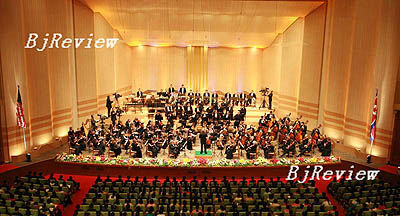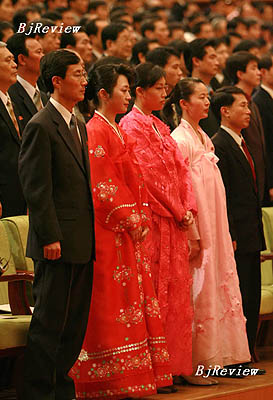|

American poet Henry Wadsworth Longfellow said music was the universal language of mankind. His words rang true at the New York Philharmonic's concert on February 26 in Pyongyang. The unprecedented performance showed that after a half-century of confrontation, North Korea and the United States finally found a language that could enhance their understanding of each other.
The New York Philharmonic visited North Korea on February 25-27. It gave one formal concert in the East Pyongyang Grand Theater and played informally with North Korean musicians at other time, starting a prelude of more communication and dialogue between the two countries. International affairs experts around the world said the orchestra's historical visit was an exceptional kind of "music diplomacy" or "philharmonic diplomacy."
"The tour marked a milestone in the two countries' efforts to ease up their tense relations," said Shen Shishun, Director of the Asia-Pacific Security and Cooperation Department at the China Institute of International Studies (CIIS). Although the visit was a cultural exchange, it inevitably was imbued with political and diplomatic significance, he said.

Shen pointed out that first two songs the orchestra played in its formal concert-North Korea's national anthem Patriotic Song and the U.S. national anthem The Star-Spangled Banner--indicated that the two countries recognized each other as sovereignty.
In an interview with Xinhua News Agency, Jin Xide, a senior research fellow at the Chinese Academy of Social Sciences (CASS), said the orchestra's performance in North Korea was a tour that had "melted ice in hearts" and was a turning point that would improve the two countries' bilateral relationship.
Both North Korea and the United States had high praise for the New York Philharmonic's Pyongyang performance. After the tour, North Korean Culture Minister Kang Nung Su did an interview with The Wall Street Journal, in which he called the performance "the first step to cultural exchanges between the two countries." Kang also said the North Korean state orchestra would visit the United States, if the Americans invited it.
An article in The New York Times said the concert was the first time a major American cultural organization had appeared in North Korea and that the orchestra formed "the largest contingent of U.S. citizens since the Korean War."
Other reports said former U.S. President George H.W. Bush would likely visit North Korea as an envoy of the White House. A report in the Beijing-based journal International Herald Leader said such a visit could be seen as a continuation of the New York Philharmonic's ice-breaking visit.
An optimistic future
Experts believe that the reason the two countries started to ease their tension was based on Pyongyang's agreement last year to dismantle its nuclear facilities. During the several sessions of the six-party talks in 2007, the North Koreans assumed an attitude of active cooperation and shut down the Yongbyon reactor as scheduled.
"North Korea at least showed its sincerity to the United States to give up its nuclear program and that deserved to be encouraged by the U.S. side," Shen from the CIIS said.
Jin from the CASS pointed out that North Korea's invitation to the New York Philharmonic was a friendly gesture to the United States and a positive signal to the international community for three reasons. First, the decision to invite the New York Philharmonic indicated that Pyongyang's policy of warming its relations with the United States had not changed and was a reassurance to the rest of the world. Second, it showed Pyongyang's self-confidence in thawing its relations with Washington. Third, although the declaring and dismantling of its nuclear facilities had not been proceeding smoothly due to political and technical elements, North Korea still wanted to prove its sincerity on this point, Jin said.
He also pointed out that some hardliners in the United States, such as former U.S. Ambassador to the United Nations John Bolton, insisted that the United States should not trust North Korea. But Pyongyang's invitation was a good counterattack to similar comments, he said. The New York Philharmonic's performance showed that the U.S. side was willing to extend an olive branch to North Korea.
| 